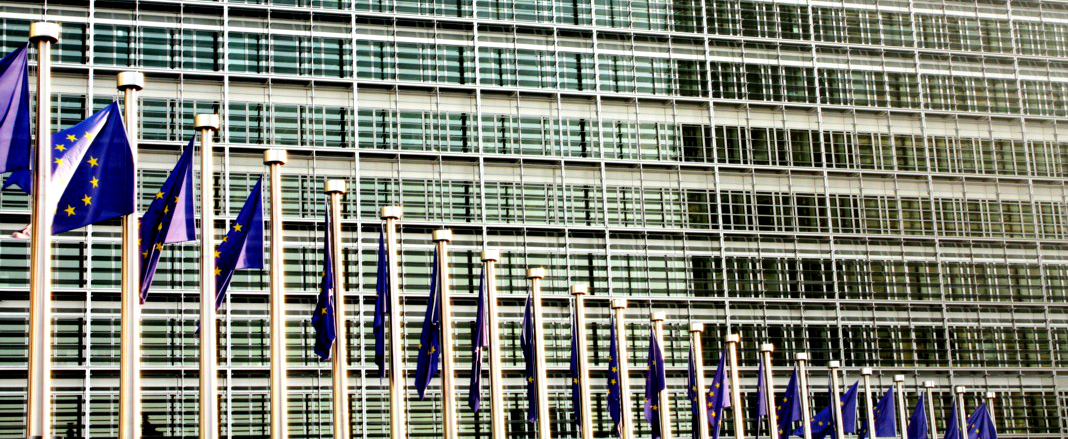
By Sietse Blom, Secretary of the EST Think Tank. Sietse is following an internship at Cordaid in The Hague this year, after graduating with a BA in Political Science at the University of Amsterdam.

After the collapse of the communist bloc of Russia and its influence sphere, the former satellite states of Russia longed for change (Nye, 2004: 5). The wealth, liberties and democratic values the European Union holds high lured the Eastern European countries into adapting. The attractive power the EU possessed over the applicant Member States made them reshape to fit to the Copenhagen Criteria for membership. In the conditions the EU set for applicant states, it demanded candidates to achieve stable institutions, rule of law, human rights and respect for minorities. Besides that, a functioning market economy, competitive economic capacity and the adaptation to European law and legislation were demanded (Commission, 2007: 6; Smith, 2011: 306). From planned economies within the communist influence sphere of Russia, Eastern European countries were shaped by the conditions the EU set into becoming market economies with a democratically elected government and more liberal values (Commission, 2007: 6; McCormick, 2011: 68-70). The willingness to fit the EU’s conditions shows the soft power the EU exercised through conditionality. Moreover, the EU shaped the preferences of others and possessed the ‘ability to define what passes for ‘normal’, which denotes normative power (Manners, 2002: 253). Therefore Smith states that ‘the EU’s enlargement policy has been its most successful foreign policy’ (Smith, 2011: 300). The expansion Eastward also fulfilled the EU’s desire for peace, security and stability in their own backyard. After the tenses had risen so high during the Cold War and the terrorist attack in 2001 on the Twin Towers shocked the world, the EU longed for a secure stable European region (Schimmelfennig and Sedelmeier, 2002: 501).
However, this conditionality of the EU can also pose a threat to its international potential, which will be further discussed in the following sections after a few short conceptualisations, beginning with the concept of conditionality. Sasse describes the conditionality as ‘clear incentive and enforcement structures’, by which she means that the EU set conditions to which they expect countries to live up to (Sasse, 2008: 295). Both in the European Neighbourhood Policy (ENP) as in the enlargement policy, the EU used conditionality, although there is no prospect of membership in the ENP (Sasse, 2008: 296). The ENP focuses on strengthening ties with states in and around the continent Europe and stabilising the ‘ring around Europe’, where the enlargement policy focuses merely on candidate member states. Another concept, soft power, can be seen as influencing others without using means like threat, treat or force. Soft power can be compared to what Manners calls normative power, because both describe the ‘ability to shape the preferences of others’ (Nye, 2004: 5). Hard power on the other hand is exercised with means like threat, treat or force. With its conditionality policy the EU clearly focuses on soft power. By doing so they forget to focus on internal success and adaptation to the shifting global order in which other players, like the BRICs, have become more important (Keukeleire and Bruyninckx, 2011: 386). The conditionality policy has served its purpose through shaping countries longing for membership. It is however not as effective in shaping current ENP countries (Sasse, 2008: 296). While the ENP focuses on countries in North Africa, the Middle East and the far East of Europe, huge cultural, economical and political differences make exerting influence hard for the EU. The motives of the ENP countries are (mostly) economical, while the EU attempts to spread their political values like freedom of speech, democracy and human rights in the region. However these countries differ immensely from the EU countries and are most of the times not interested in changing. Sasse states that therefore these countries only adapt to EU-conditions they benefit from (2008: 296). Moreover, the lack of a ‘European identity’, although not concordant, can make the conditionality of the EU towards these countries inconvenient (McCormick, 2011: 25). For example, the relations with Muslim countries in the Middle East and the North of Africa, will probably not benefit from conditionality policy of the EU because of the huge differences. Besides, the trade-off between coherence in the EU and setting the common conditions for their policy can have a negative impact (Holland, 2008: 350-351). This can be seen as a problem for finding common ground within the EU, but also as a factor which hinders effectiveness of conditionality. For example, when looking at the conditionality the EU attempts to follow through in their development policy, achieving international success remains hard (Holland, 2008: 358). Measuring the amount to which developing countries have lived up to the EU’s conditions like democracy, human rights or a market economy remains very hard. Besides, the EU cannot penalize development countries should they not live up to the conditions and other players like China and India are entering the development aid field (Holland, 2008: 350). The competition for influencing the development countries thus increases. Conditionality of the EU makes these countries more likely to be influenced by countries like China or India, which do not set conditions for development. So if the EU would not focus as much on conditionality in their development policy, their international potential might be more effectively fulfilled. The EU’s desire to influence countries worldwide can however also work alienating. Its attempt to shape what is seen as normal worldwide, normative power, is not something all countries are acceptant of and pleased with. ‘Firstly the EU is clearly trying to reorder the language of international society through its engagement with the ‘super-executioners’, China and the USA’ (Manners, 2002: 248). This example of Manners, even though concerning the death penalty, perfectly illustrates the EU’s extensive international drive to influence other countries normatively. This type of European arrogance is often not appreciated by other countries like China, Russia or Singapore (Callahan, 2007: 801). For example countries in the Middle East, China or Russia do not appreciate the EUs desire to spread their beliefs, like democracy, human rights or a capitalist market economy (Callahan, 2007: 801). This desire to be influential on global scale is therefore sometimes even seen as arrogance of the EU. Perfect examples of this are China concerning their climate policy and strictness on human rights, and Russia, which is not interested in more ‘fair’ democratic elections or gay rights. The conditionality policy the EU conducts is therefore potentially threatening for their international relations, because it might upset other international players. The EU’s soft or normative power and conditionality policy might thus not prove to be the most effective in achieving the EU’s international potential.
Increasing its hard power might. When cooperation among member states on the area of defense is increased, the EU can live up to its true international potential. Its military capacity has been a weak spot for decades and should in these times of increased violence and extremism worldwide be strengthened and unified. With current threats like the Islamic State in the Middle East, Boko Haram in North Nigeria and the Ukraine-crisis, the need for more hard/military power of the EU seems indispensable. Even the European Commission president Jean-Claude Juncker has stressed the need for a European army (The Guardian, 2015). With a common military force the EU would be taken more seriously internationally and ‘a common army among the Europeans would convey to Russia that we are serious about defending the values of the European Union’ (The Guardian, 2015). The current crisis in Ukraine therefore might benefit not from the conditionality the EU conducts through the ENP in Ukraine, but by showing they are capable of being a hard power as well as a soft power (Nye, 2004: 5-6). Attempts at shaping Ukraine, like the EU did with most former Soviet Union countries in the East of Europe, may have caused the aggressive reaction of Russia. The Russians might have been triggered into showing that they still are a major global player. To use a popular metaphor: ‘the EU poked the bear’ (Götz, 2015: 10).
The enlargement policy the EU followed after the fall of the Soviet Union in 1991 has had a major impact on the EU-Russia relationship. Because most Eastern European countries were formerly part of the Soviet Union and therefore the influence sphere of Russia, it was a major blow for Russia when these countries strived to becoming, and eventually became, members of the EU adapting to the EU’s conditionality demands. Russia saw its influence in the region decrease immensely which made them less and less of a global power than before (Keukeleire and Bruyninckx, 2011: 395). Other conflicts in the Middle East, like the ongoing war in Syria show that the main goal of the ENP in which the EU uses conditionality is not being fulfilled. Peace and security in the region seem further away than ever. In this conflict the EU has done little that indicates they are actively contributing to a peace agreement, or helping to install more stable institutions, a rule of law or justice for every citizen. So when looking at the international potential of the EU, there is still much to gain. Even though they have achieved a lot in shaping the Eastern European countries politically, economically and even normatively, the current ENP proves less beneficent. Undeniably the EU showed a possession of much soft power through their enlargement policy. However, unlike the enlargement policy, the conditionality in the ENP cannot be strengthened by potential membership and focuses on countries with enormous differences, which make it to be hindering the EU’s international potential more than empowering it. Through its conditionality policy the EU becomes more and more a payer instead of a player. The EU’s development policy portrays this perfectly, because it shows that it is hard for the EU to come up with common coherent conditions, it is hard to effectively control the conditions and it might hinder the EU’s ‘competitive position’ on the ‘development market’. Lastly, the EU’s conditionality can by some countries be seen as European arrogance in their desire to influence the world and spreading their values and beliefs. Crises like the Syrian war and the Ukraine-conflict show that the need for more than conditionality and soft power of the EU is indispensible. The EU should finally step up to its international potential and become an adequate influencer of stability, justice and peace instead of only norms and values.
Sources
Callahan, W. A. (2007) Future imperfect: The European Union’s encounter with China (and the United States). Journal of Strategic Studies, 30 (4-5), pp. 777-807.
European Commission (2007) Understanding Enlargement: The European Union’s Enlargement Policy. European Commission: Directorate General for Enlargement.
Götz, E. (2015) It’s geopolitics, stupid: explaining Russia’s Ukraine policy. Global Affairs, 1 (1): pp. 3-10.
Holland, M. (2008) The EU and the Global Development Agenda. Journal of European Integration, 30 (3), pp. 343-362.
Nye, J.S. (2004) Soft Power. The means to Success in World Politics. New York: Public
Affairs, Chapter 1.
Keukeleire, S. and Bruyninckx, H. (2011) The European Union, the BRICs, and the Emerging New World Order. In: International Relations and the European Union. New York: Oxford University Press.
Manners, I. (2002) ‘Normative Power Europe: A Contradiction in Terms’. Journal of
Common Market Studies 40(2), pp. 235-258.
McCormick, J. (2011) Understanding the European Union. Hampshire: Palgrave Macmillan.
Sasse, G. (2008) The European Neighbourhood Policy: Conditionality Revisited for the EU’s Eastern Neighbours. Europe-Asia Studies 60 (2), pp. 259-316.
Schimmelfennig, F and Sedelmeier, U. (2002) Theorizing EU enlargement: research focus, hypotheses, and the state of research. Journal of European Public Policy, 9 (4), pp. 500-528.
Smith, K. E. (2011) Enlargement, the Neigbourhood, and European Order. In: International Relations and the European Union. New York: Oxford University Press.
The Guardian (2015) Jean-Claude Juncker calls for EU army. (latest consult 24 March: http://www.theguardian.com/world/2015/mar/08/jean-claude-juncker-calls-for-eu-army-european-commission-miltary)
- Articles and Blogs
- EU Foreign Policy
- EU Policy Process
- EU-Africa
- EU-USA
- Eurocrisis
- Geen categorie
- Uncategorized

 Domestic abuse in England & Wales: a historical legal gap bridged by Section 76 of the Serious Crime Act 2015?
Domestic abuse in England & Wales: a historical legal gap bridged by Section 76 of the Serious Crime Act 2015?  Looking back at Burden and Burden v. the UK: Are siblings being legally overlooked?
Looking back at Burden and Burden v. the UK: Are siblings being legally overlooked?  The European Housing Crisis from the Human Rights Perspective
The European Housing Crisis from the Human Rights Perspective  Female Suicide Bombers As A Security Threat: Towards A More Comprehensive And Inclusive Approach
Female Suicide Bombers As A Security Threat: Towards A More Comprehensive And Inclusive Approach 


